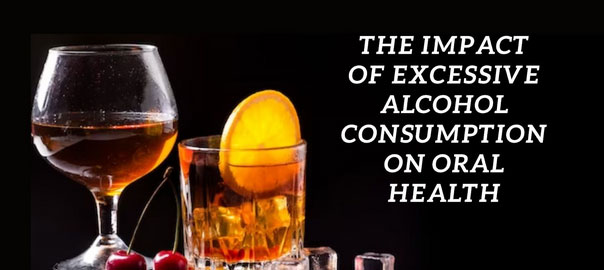
The Impact of Excessive Alcohol Consumption on Oral Health
Good oral health can be said to be quite vital to our overall well being; a lot can be contributed towards the achievement of this health goal by lifestyle choices. Alcohol consumption has been linked to a host of problems including scarring of the liver as well as accidents. Its adverse impact on oral health is often overlooked. This blog post will explain how excessive drinking affects the dental health and the necessity of retaining things within limits for a healthy mouth.
- Dry Mouth:
Over-exuberant drinking results in dryness of the mouth or xerostomia. Alcohol is a diuretic; thus, it increases urination, and the body loses fluids resulting in reducing saliva production. Saliva is paramount for oral health because it helps push away food particles, neutralize acids, and prevent the bacterial multiplication. The absence of saliva elevates the risk of developing tooth decay, gum diseases, and bad breath.
- Dental Decay:
Alcohol, which often ends up in any cocktail or mixed drink that contains sugar or is regularly mixed with acidic soda can eat away the enamel of the tooth, thus causing teeth to decay. Alcoholic drinks contain a higher content of sugar, an area that breeds oral bacteria, and these are the same bacteria that produce acids for attacking the teeth. More so, acidic content in some alcohol drinks directly eats away at the enamel of the teeth, hence making the teeth more vulnerable to decay.
- Gum Disease:
Long-term consumption of over-alcohol use depletes the immune system, and the body becomes vulnerable to infections, including gum disease. The gums may become red, sensitive, and bleeding. Gum disease may advance to periodontitis-a more severe infection causing damage to the gums and even loosening the teeth due to gum recession or loss of teeth and bones.
Another agent implicated is alcohol, which involves a higher risk of inducing gingivitis.
- Oral Cancer:
Probably the most disastrous consequence of alcohol abuse is the risk of oral cancer. Alcohol alone considerably increases the risk of someone’s oral, throat, and esophagus cancers, especially when used with cigarette smoking. There is a published view that alcohol contains chemicals which damage the DNA of the cell lining in the oral tissue and subsequently result in abnormal cell growth, which leads to the development of carcinogenic lesions.
- Oral Pain:
Alcohol irritates oral tissues causing toothache and pain. It makes the oral cavity feel burning and makes ulcers painful in the mouth. Alcohol abuse delays recovery and compromise of the immune system, making one more prone to fungal infections like thrush. Heavy drinkers risk developing malfunctions in oral tissues and hinder their oral, eating, and speaking functions and their quality of life.
Even though moderate alcohol drinking is assumed to have some benefits to health, high and chronic alcohol intake would pose severe risks to oral health. Thus, watching our habits of drinking and keeping ourselves temperate is the need of the hour. Keeping good oral hygiene, brushing twice a day, flossing, and dental check-ups are critical to fighting the evils of alcohol against oral health. If the person or any one of your family members is found to abuse alcohol, then in this scenario, it is pertinent to take professional treatment and proper support to gain good health.
Indeed, if we have a healthy smile, it indicates that we may have good oral health as well as its significance of having a healthy body. Let us, therefore, consciously make choices about looking after our oral health to create a brighter and healthier future.
Leave a Reply
Leave a Reply
Explore More Similar Posts
Explore More Blogs


Leave a Reply